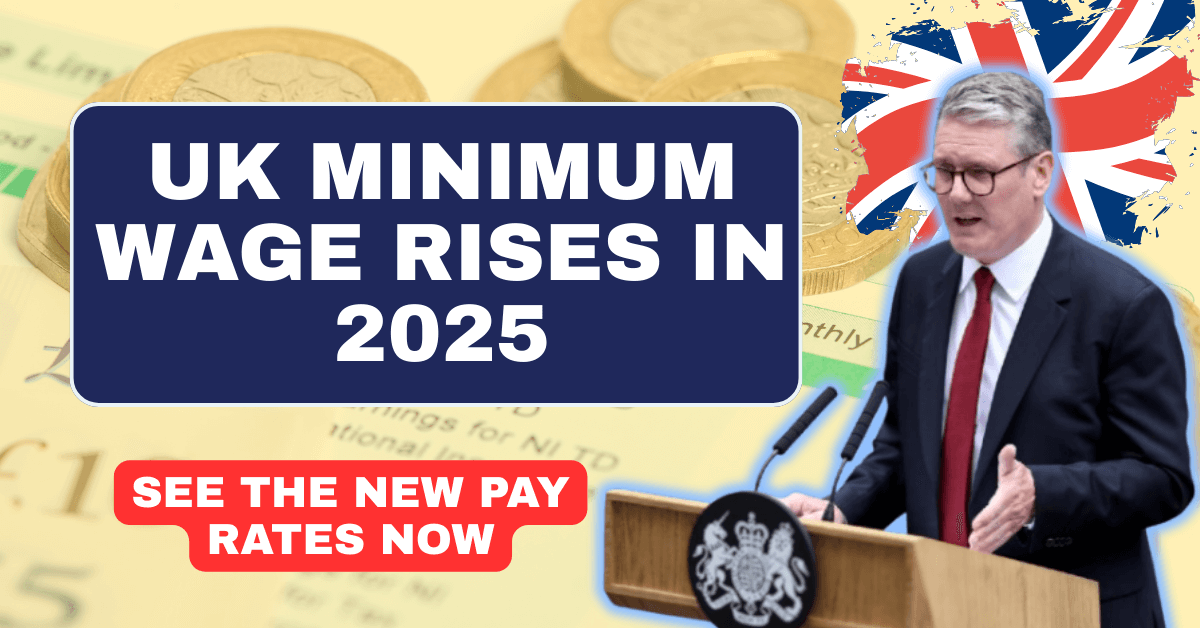The UK government has announced a significant increase in the national minimum wage for 2025, aiming to support workers amidst the rising cost of living. Millions of employees will see higher pay starting from April 2025, with new rates applying to different age groups and types of employment.
Why the Increase Is Happening
The rise is part of the government’s long-term strategy to ensure that wages keep pace with inflation. Economic studies have shown that higher wages improve living standards, reduce dependency on benefits, and encourage job retention.
New Minimum Wage Rates for 2025
The updated wage structure will apply across various age brackets. Here’s the projected breakdown based on the latest government updates:
-
National Living Wage (Age 23+) – Expected to rise to around £12.00 per hour.
-
Age 21–22 – Increased to £11.50 per hour.
-
Age 18–20 – Will go up to £9.10 per hour.
-
Under 18 – Rising to £7.20 per hour.
-
Apprentices – Set to reach £7.00 per hour.
These figures are indicative of the latest projections and may be finalised closer to April 2025.
Impact on Full-Time Workers
For full-time employees working 35–40 hours per week, this wage rise means a significant increase in annual income. A worker earning the new National Living Wage could see their yearly pay rise by over £1,000 compared to 2024 rates.
Benefits for Young Workers and Apprentices
Younger workers and apprentices will also benefit from higher pay, ensuring fairer compensation for entry-level roles and early career positions. This move is aimed at reducing wage gaps and promoting equal opportunities in the workforce.
What Employers Need to Know
Employers are legally required to pay these new rates starting April 2025. Non-compliance can lead to penalties, fines, and even being publicly named and shamed by HMRC. Employers should review their payroll systems early to ensure smooth transitions.
Impact on Businesses
While the increase brings financial relief for workers, small businesses may face additional payroll costs. However, government officials suggest the higher wages will boost spending power, stimulating the economy and potentially offsetting costs through increased consumer demand.
Regional Variations
Although the national minimum wage is uniform across the UK, regional living costs vary greatly. In areas like London, wages may still feel low compared to housing and living expenses. Experts believe further adjustments may be considered in future reviews.
How This Affects Pension Contributions
Higher wages also mean increased pension contributions for workers enrolled in automatic pension schemes. This ensures that not only do workers earn more now, but their retirement savings grow faster.
Reactions from Trade Unions and Employers
Trade unions have welcomed the rise but are calling for more ambitious targets, such as a £15 per hour minimum wage in future years. Some employer groups, however, express concern about the additional financial burden, particularly for small enterprises.
Government Support for Small Businesses
To ease the transition, the government may provide tax reliefs or financial incentives for smaller businesses. Announcements on support packages are expected early in 2025.
How to Check if You Are Getting Paid Correctly
Workers can check their payslips to ensure their hourly rate meets or exceeds the legal minimum from April 2025. If underpaid, employees can raise a complaint with HMRC, which has powers to recover unpaid wages.
Possible Future Wage Increases
Economists predict that wage growth will continue beyond 2025, particularly as the cost of living remains high. Future reviews will consider inflation, average earnings growth, and economic conditions.
What It Means for the UK Workforce
Overall, this rise in minimum wage reflects the government’s effort to reduce income inequality and support low-income workers. It also highlights an evolving labour market where fair pay is becoming a central issue.
Key Takeaways
-
The minimum wage increases significantly from April 2025.
-
Workers across all age groups and sectors will benefit.
-
Employers must comply or face legal action.
-
Further wage rises could be announced in coming years.
Final Thoughts
The 2025 wage increase is one of the most important changes for UK workers in recent years. Employees are encouraged to review their pay carefully, while employers should prepare payroll adjustments well in advance to meet legal obligations.
